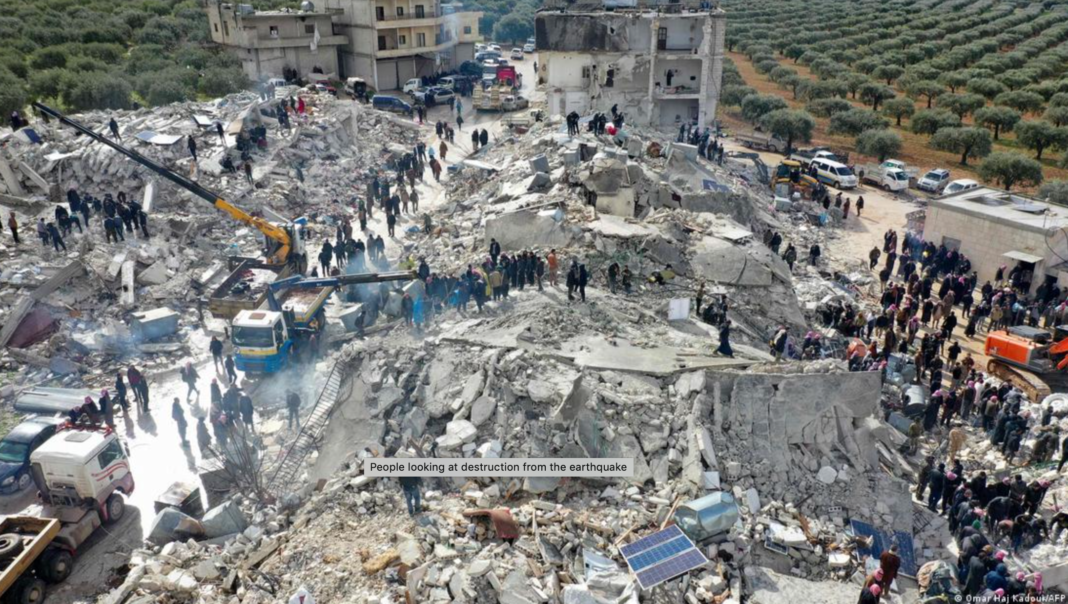« Turkish President Recep Tayyip Erdogan hollowed out state institutions, placed loyalists in key positions, and enriched his cronies—paving the way for this tragedy. » Gönül Tol analyzes in Foreign Policy on February 10, 2023.
In the southern Turkish city of Antakya, Behzat put a blanket and an umbrella over his father, who was trapped under the rubble after one of the most devastating earthquakes in recent history hit the town and destroyed Behzat’s childhood home. He dug his father out with his bare hands and promised the old man, whose legs were stuck under a concrete block, that help was on the way.
Twenty-four agonizing hours later, Behzat asked his wife, my sister Gokce, to check on him. “I cannot look him in the eye anymore. I told him help was coming. It isn’t.” Behzat’s father died, as did his mother, his cousins, and thousands of others, because there was no one there to provide the needed help.
It wasn’t just loved ones who were buried under the rubble but also the promises of good governance, a corruption-free country, and a state that is responsive to the needs of its people.
Turkish President Recep Tayyip Erdogan made those promises after his Justice and Development Party (AKP) swept to power following another devastating quake in northwestern Turkey in 1999, when thousands of people died due to the government’s slow response. He blamed all the ills of the 1990s on widespread corruption, dysfunctional governments, and unresponsive state institutions and pledged that, under his rule, things would change radically.
They have, and they have not. Gone are the days when internal squabbling among coalition partners paralyzed government decision-making. In his two decades at the helm, Erdogan has centralized power in his own hands. To do that, he hollowed out state institutions, placed loyalists in key positions, wiped out most civil society organizations, and enriched his cronies to create a small circle of loyalists around him. The culmination of all those things paved the way for the tragedy that struck my country on Monday.
The sheer magnitude of the quake made it deadly, but academic research shows that earthquakes kill more people in countries affected by widespread corruption. The Turkish economy under Erdogan rode high on the back of a construction boom. He enriched a small circle of close associates from the construction sector by awarding them infrastructure projects without competitive tenders or proper regulatory oversight.
These companies embarked on a massive building spree, constructing infrastructure and homes in earthquake hot spots without following proper building codes. In Hatay, one of the areas hardest hit by Monday’s quake, residential buildings, hospitals, and even the local branch of the Turkish Disaster and Emergency Management Presidency (AFAD), many built by Erdogan’s cronies, were either leveled to the ground or suffered massive damage. The town’s only airport runway, built on top of a fault line by a company closely tied to Erdogan, was split in two by the earthquake.
The practice of granting government infrastructure projects to Erdogan’s allies, many of whom cut corners on safety, has led to other tragedies in the past. Last year, a snowstorm hit the western city of Isparta, causing extensive damage, leaving residents without power for weeks, and leading to several deaths. The city’s utilities had been privatized by the AKP and sold off to companies owned by Cengiz Holding and Kolin Holding, firms controlled by Erdogan’s closest associates. The companies did not take steps to ensure the infrastructure was resilient to such disasters, failed to respond when the snowstorm hit, and rejected any help from opposition parties in neighboring towns, sparking protests by residents and opposition parties against the corrupt tender system.
In 2018, as a result of a lack of maintenance work, a train crash in the northwestern town of Corlu killed 25 people, including children. In 2014, 301 miners were killed in the Aegean town of Soma after an explosion sent carbon monoxide shooting through the tunnels of a mine while 787 miners were underground. The chairman of Soma Holding, Alp Gurkan, is another close associate of Erdogan’s. The company benefited from privatizations during the AKP’s years in power, branching out into the construction sector and receiving contracts worth billions of dollars. The miners and opposition parties said the company did not take necessary security precautions. Only 20 days before the explosion, Erdogan’s AKP had thwarted an opposition-led parliamentary motion to investigate conditions at the mine.
Foreign Policy, February 10, 2023 by Gönül Tol.

